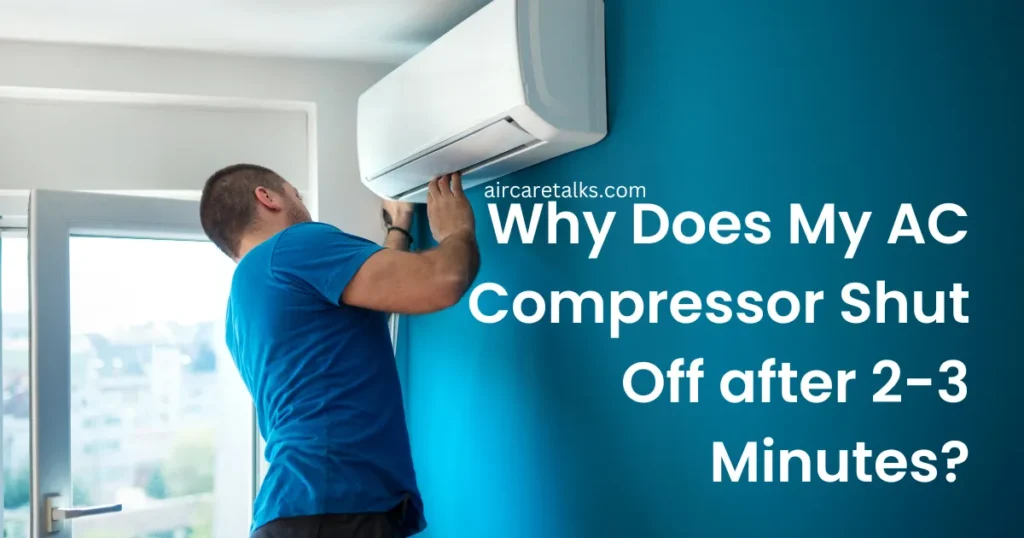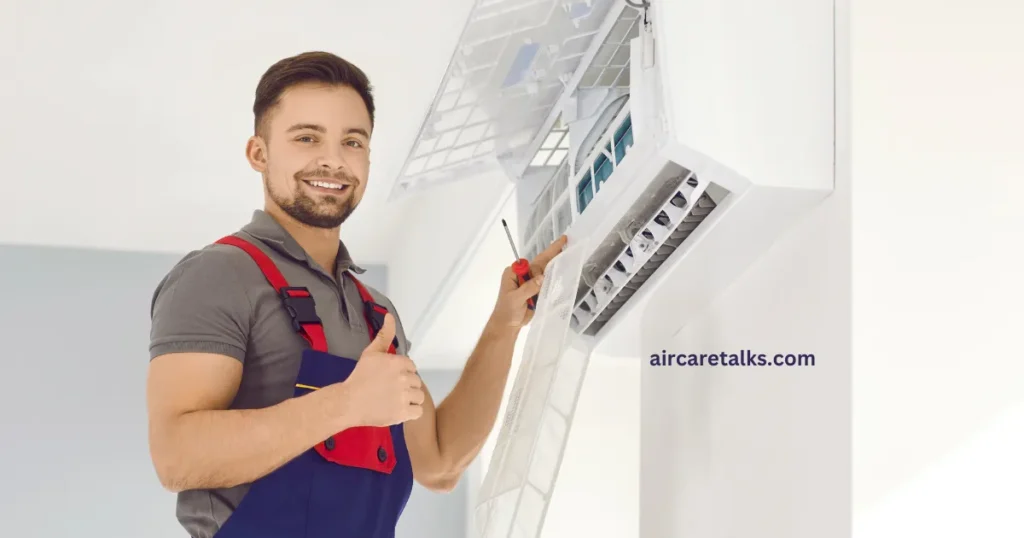
Imagine a sweltering summer day. You crank up the AC, expecting a blast of cool air. But instead, the relief is short-lived. The air conditioner cools for a measly 2-3 minutes before shutting off, leaving you hot and frustrated.
If this scenario sounds familiar, you’re likely experiencing a problem called short cycling. This is when your AC compressor rapidly turns on and off, preventing it from effectively cooling your home. But don’t worry, this guide will help you understand why your AC compressor might be shutting off after 2-3 minutes and what you can do to fix it.
Contents
- 1 What is Short Cycling and How Does it Affect Your AC?
- 2 Fixing Your AC Compressor Turning Off After 2-3 Minutes: Troubleshooting Tips and Taking Action
- 3 Reasons For Why Does My AC Compressor Shut Off after 2-3 Minutes?
- 4 When to Call a Professional HVAC Technician
- 5 How do I keep my air conditioner running smoothly?
- 6 Conclusion: Keeping Your Cool with a Healthy AC System
What is Short Cycling and How Does it Affect Your AC?
An air conditioner works by continuously circulating refrigerant through a closed loop. The compressor pressurizes the refrigerant, causing it to heat up in the outdoor unit (condenser coil). The hot refrigerant then travels inside, where it releases heat in the indoor unit (evaporator coil). A fan blows air over the cool evaporator coil, and this cool air is distributed throughout your home.
In a healthy AC system, the compressor runs for sustained periods, maintaining a comfortable temperature. However, in short cycling, the compressor shuts off prematurely, disrupting this cycle. This can lead to several problems:
- Increased Wear and Tear: The frequent on-and-off cycles put extra strain on the compressor, shortening its lifespan and potentially leading to expensive repairs.
- Reduced Efficiency: Each time the compressor restarts, it uses a surge of energy. AC compressor short cycling increases these energy spikes, leading to higher electricity bills.
- Inconsistent Cooling: The rapid on-off cycling makes it difficult for the AC to maintain a consistent temperature. Your home may feel cool for short periods, followed by uncomfortable warm spells.
Fixing Your AC Compressor Turning Off After 2-3 Minutes: Troubleshooting Tips and Taking Action
Before calling a professional, there are a few DIY troubleshooting steps you can try to address short cycling:
- Check and Replace Air Filter: Regularly check and replace your air filter according to the manufacturer’s recommendations (usually every 1-3 months). A clean air filter ensures proper airflow and prevents the compressor from shutting off due to restricted airflow.
- Ensure Vents Are Open: Make sure furniture, rugs, or other objects are not blocking vents and return air grilles. Adequate airflow is crucial for efficient AC operation.
- Clean Condenser Coils (with Caution): Carefully clean the condenser coils on the outdoor unit following safety guidelines (avoid using water pressure that can damage the fins). Clean coils allow for proper heat release and prevent the compressor from overheating. If the coils are heavily clogged, consider professional cleaning.
- Try Resetting the Thermostat: Refer to your user manual and try resetting the thermostat. This can sometimes clear minor glitches that might be causing the AC compressor short cycling.
Reasons For Why Does My AC Compressor Shut Off after 2-3 Minutes?
Several factors can cause your AC compressor to shut off after 2-3 minutes. Here are some of the most common Reasons:
1. Restricted Airflow
- Dirty Air Filter: A clogged air filter restricts airflow over the evaporator coil, hindering its ability to absorb heat. This can trick the thermostat into thinking the space is cooler than it actually is, causing the compressor to shut off prematurely.
- Blocked Vents/Ducts: Furniture, rugs, or dust buildup can block vents and ducts, reducing airflow to the entire system. This can also cause the compressor to short cycle.
2. Low Refrigerant Levels
- Refrigerant is the lifeblood of your AC system. It absorbs heat indoors and releases it outdoors. Low refrigerant levels can lead to the evaporator coil not absorbing enough heat, causing the compressor to shut off prematurely. Refrigerant leaks can develop gradually or suddenly.
3. Overheating
- Dirty Condenser Coils: The condenser coils, located outside the unit, release heat from the refrigerant. Dirty coils can restrict airflow and prevent the system from releasing heat effectively. This can cause the compressor to overheat and shut off to prevent damage.
4. Electrical Issues
- While less common, electrical problems like a faulty capacitor or control board can disrupt the power supply to the compressor, causing it to shut off unexpectedly.
5. Faulty Thermostat
- A malfunctioning thermostat can send inaccurate readings to the AC unit. For example, a faulty thermostat might think the desired temperature has been reached even when the house is still hot, causing the compressor to shut off prematurely.
6. Oversized AC Unit
- An AC unit that’s too large for the space can cool the room too quickly. Once the desired temperature is reached very quickly, the compressor shuts off, leading to short cycling.
When to Call a Professional HVAC Technician

If you’ve tried the troubleshooting steps above and your AC compressor is still shutting off after 2-3 minutes, it’s time to call a qualified HVAC technician. They have the expertise and tools to diagnose the specific cause of the problem and recommend the appropriate repair solution. Here are some situations where a technician is necessary:
- For any electrical issues. Electrical problems can be dangerous and should only be addressed by a qualified professional. Attempting to fix electrical problems yourself can lead to serious injuries or even electrical fires.
- If you suspect a refrigerant leak. Adding refrigerant requires specialized equipment and training to ensure proper handling and avoid environmental hazards. Refrigerant leaks can also be a sign of a more significant underlying issue in the AC system.
- If the problem persists after trying basic troubleshooting steps. A technician can diagnose complex issues beyond restricted airflow or dirty filters. They can perform repairs like replacing a faulty capacitor, fixing a refrigerant leak, or even recommending AC replacement if the unit is nearing the end of its lifespan.
How do I keep my air conditioner running smoothly?
Here are some additional tips to help prevent short cycling and ensure your AC system operates efficiently:
- Schedule Regular Maintenance: Regular professional maintenance (usually annually) can help identify potential problems before they cause short cycling or other AC issues. A technician can clean the entire system, check refrigerant levels, and ensure all components are functioning properly.
- Invest in a Programmable Thermostat: A programmable thermostat allows you to set different cooling temperatures for different times of the day. This can help prevent your AC from running constantly and reduce energy consumption.
- Consider Replacing Your Air Filter More Often: In dusty environments, or if you have pets, consider replacing your air filter more frequently than the manufacturer’s recommendation (every 1-2 months instead of 3). This will ensure optimal airflow and prevent the compressor from shutting off due to a clogged filter.
- Address Blocked Vents Promptly: Don’t allow furniture, rugs, or other objects to block vents for extended periods. Regularly check and ensure all vents are unobstructed for proper air circulation.
- Right-Size Your AC Unit: When replacing your AC unit, ensure it’s properly sized for your home’s square footage and cooling needs. An oversized unit is more likely to short cycle.
Conclusion: Keeping Your Cool with a Healthy AC System
AC compressor short cycling Short cycling can be a frustrating issue, but by understanding the causes and taking proactive steps, you can keep your AC compressor running smoothly and efficiently. Remember:
- Regularly check and replace your air filter.
- Ensure vents are unobstructed.
- Clean condenser coils (with caution) if needed.
- Consider resetting the thermostat.
- Call a qualified HVAC system technician for electrical issues, suspected refrigerant leaks, or persistent problems.
- Schedule regular maintenance for preventative care.
- Invest in a programmable thermostat for energy savings.
- Address blocked vents promptly.
- Consider right-sizing your air conditioning unit if replacing it.
By following these tips, you can ensure your AC system operates optimally, keeps your home cool and comfortable, and avoids the costly consequences of short cycling.